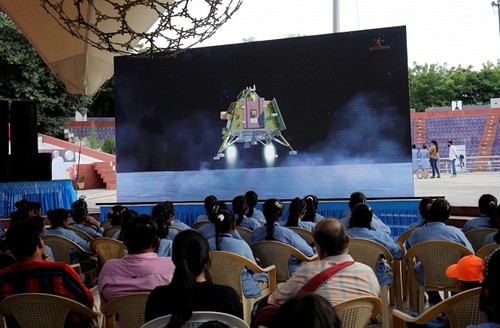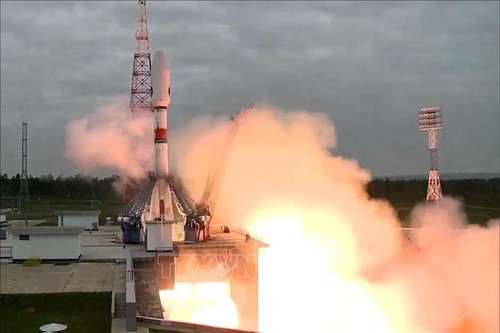 Indians watch Chandrayaan-3 spacecraft landing on the Moon on August 23, 2023. (Photo: Reuters) Indians watch Chandrayaan-3 spacecraft landing on the Moon on August 23, 2023. (Photo: Reuters) |
The US and China continue to lead the space industry with large-scale programs to explore the Moon and Mars, but 2023 also saw great progress by India’s aerospace industry and the return of Russia.
India’s historic moon landing
August 23, 2023, went down in history when India's Chandrayaan-3 spacecraft landed near the south pole of the Moon, where scientists believe there is a large field of ice and minerals that may someday support human life.
This is the first time any country has successfully landed a spacecraft at the Moon's south pole. The achievement made India just the 4th country to conquer the Moon, after the US, the former Soviet Union, and China. Just two weeks after the Chandrayaan-3 spacecraft landed on the Moon, India launched its first spacecraft to study the Sun.
Peter Garretson, Senior Fellow in Defense Studies of the American Foreign Policy Council, said India’s success shows that the old order in the aerospace field has changed. Ruchira Kamboj, India’s Permanent Representative to the United Nations, called India's achievements a great inspiration to developing countries to pursue their ambition to conquer outer space.
“This achievement not only marks India’s presence on the Moon but also symbolized the aspirations of 1.4 billion Indians. Beyond that, it's a historic moment for humanity as we venture into uncharted territory near the moon's South Pole. This success is dedicated to all humanity. And that India’s success should spurs other countries from the Global South to do like us," said Ruchira Kamboj.
2023 also saw Russia launch the Luna-25 spacecraft, its first lunar mission since the Soviet Union's Luna-24 brought Moon samples back to Earth in 1976. Although Luna-25 had trouble landing on the Moon, the launch marked Russia's attempt to return to its position as a space power.
 Russia's Luna-25 spacecraft is launched from Cosmodrone Vostochny on August 11, 2023. (Photo: AFP/VNA) Russia's Luna-25 spacecraft is launched from Cosmodrone Vostochny on August 11, 2023. (Photo: AFP/VNA) |
The US and China continue to pursue large projects. The US is accelerating its Artemis program to take humans back to the Moon, which it hopes the Artemis II mission will accomplish by the end of 2024.
China is also making strides to send humans to the Moon by 2030. China has developed booster rockets, manned spacecraft, landing modules, and a new generation of lunar rovers that can carry a crew.
The UK, Germany, Italy, France, the UAE, and Israel have also announced plans to explore space and the Moon in the near future. This year's space race was also joined by private companies, including US billionaire Elon Musk’s SpaceX, US businessman Jeff Bezos’s Blue Origin, and British billionaire Richard Branson’s Virgin Galactic.
Ensuring security in space
The space race has created some new challenges for humanity. UN data shows that more satellites were launched in the past decade than were launched in the previous five decades. There are now 900 satellites in low Earth orbit, double the number that was up there two years ago.
The rapid increase in the number of satellites creates security risks such as collisions and space debris, and threatens future space travel. The threat of militarization is increasing as countries develop new technologies and weapons capable of disrupting other countries’ satellites and spacecraft.
UN Under- Secretary General Guy Ryder says the world community should create a new global governance mechanism for aerospace security. “This urgency is driven by rapid technological developments and by geopolitical dynamics. It threatens to extend to conflict in to space. If we can not make progress in addressing gap in presence governance, especially around space security, then we risk the potential armed race in outer space, and the catastrophic lost of services that all space and all people rely on,” Ryder said.
The main law governing space is the 1967 Outer Space Treaty, which bans the deployment of nuclear weapons or military bases in space, but does not limit conventional weapons. In order to ensure security and prevent an arms race in space, the UN General Assembly earlier this month passed a draft resolution titled “No first placement of weapons in outer space”.
The Russian-proposed resolution, co-sponsored by Belarus, China, Cuba, North Korea, and Egypt, calls on all countries, especially those with space capabilities, not to become the first country to deploy weapons in space. It’s seen as important step toward building an International Convention on this matter amid increasing geopolitical tension.